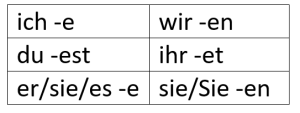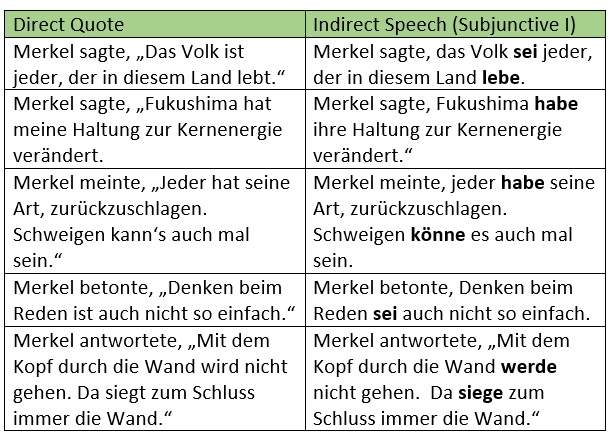5 Kapitel 11.2: Indirect Speech (Subjunctive I)
11.2: Indirect Speech
In English, we often sum up what people say or think indirectly, that is without quoting them word for word.
- My mother thinks the current fashion is awful.
- The president reported the economy is improving.
- The doctor said you guys need to exercise more.
We can do this in German as well. It is often found in the news because things that politicians and officials say are quoted all the time. In German, we use the subjunctive I (NOT the same as subjunctive II which you learned in 11.2) to distance ourselves from the quotes. In other words, we’re just repeating the message, not necessarily agreeing with it or believing it.
Beispiel: If you’re writing a history paper on World War II, you might need to indirectly talk about what Hitler thought or said. You would put his words into the subjunctive I to show that you don’t necessarily agree with him; you put distance between yourself and his opinions.

Hitler meinte, Juden, Homosexuelle, und Sinti und Roma seien Untermenschen. Er war der Meinung, Deutschland solle ein Bündnis mit Italien anstreben.
→ Notice that the verbs after his quoted thoughts look a little different: seien, solle.
This is the subjunctive I.
WHY is this important? Well, for one, if you write a paper on Hitler and quote some of his ideas, you don’t want to sound like you support him. Use the subjunctive I to say in effect, “This is what he said; I don’t necessarily agree with it. I’m just putting it out there, so don’t shoot me. I’m just the messenger!”

What about newscasts? If you have a report from the police about something that a criminal did that may or may not yet be confirmed, you’ll want to put the quoted statement in the subjunctive I. Otherwise, it might sound like you believe an unconfirmed statement, which would sound really unprofessional on the news. The news should sound neutral.
In English, newscasters often add the word “allegedly” to their stories to show that they’re just reporting what was told to them and to show that they’re being neutral.


How to form the subjunctive I:
- Conjugate every single verb in the language (except sein) as if it were regular. Yes, throw every stem-change out the window, every irregular modal verb, etc.
- Then add the subjunctive endings, which are same as subjunctive II from section 11.1.

The ONLY verb that doesn’t follow this pattern is sein:


Beispiele: Zitate von der ehemaligen Bundeskanzlerin Angela Merkel.


But…sometimes the subjunctive I ends up looking EXACTLY like the indicative (aka present tense non-subjunctive). What the heck do we do in that case to show that it’s different?
Use the subjunctive II! (Which you learned in 11.1.)
BEISPIELE:
Direkte Rede: Walt Disney sagte, „Alle Träume können wahr werden.“
Indirekte Rede:
- If we use subjunctive I, “können” looks just like present tense indicative: Disney behauptete, alle Träume können wahr werden.“
(Therefore, we default back to subjunctive II to make it look different.)
- Disney behauptete, alle Träume könnten wahr werden.“

Direkte Rede: Gorbatschew sagte, „Wer zu spät kommt, den bestraft das Leben.“ («Кто опаздывает, того наказывает жизнь.») 7. Oktober, 1989
Indirekte Rede: Gorbatschew sagte, wer zu spät komme, den bestrafe das Leben. 7. Oktober, 1989
One more reason that indirect speech with subjunctive I is useful→when you quote people in research papers! Research should be neutral.
Watch Deutsches Geplapper’s video to see examples of indirect speech in the Tagesschau, the German national news:
Ex. A: Indirekte Rede. Bilden Sie aus jedem Satz in der direkten Rede einen Satz in der indirekten Rede.
- Johann Wolfang von Goethe (Faust): „Allwissend bin ich nicht; doch viel ist mir bewusst.“
- Johann Wolfgang von Goethe (Faust): „Die Kunst ist lang! Und kurz ist unser Leben.“
- Olaf Scholz: „Es muss ja nicht gleich eine große Party sein.“
- Angela Merkel: „Man bekommt beim Schweigen ganz gut ein Maß für die Zeit.“
- Angela Merkel: „Wir befinden uns gerade im Sommer der Entscheidungen.“
- Martin Luther: „Anstrengungen machen gesund und stark.“
- Martin Luther: „Hier stehe Ich. Ich kann nicht anders.“
- Georg Ratzinger: „Mein Bruder wird bestimmt nicht Papst.“
EXTRA PRACTICE:
- https://www.grammatikdeutsch.de/html/konjunktiv-1.html
- https://www.grammatikdeutsch.de/html/konjunktiv-2.html
- https://www.grammatikdeutsch.de/html/konjunktiv-3.html
- https://www.grammatikdeutsch.de/html/konjunktiv-4.html
- https://www.grammatikdeutsch.de/html/konjunktiv-5.html
Indirect speech in everyday life:
- Frage: Do I have to use subjunctive I in everyday life? It seems sort of awkward to talk to my friends about everything neutrally.
- Antwort: No, not really.
BUT for the most part, in everyday speech, Germans don’t use the subjunctive I to quote what people have said. They just use the plain old present tense. After all, it would sound kind of odd to distance yourself from something that your family or best friend said. By using the indicative, it has the connotation that you believe what you’re repeating.

Frage: But what if I don’t believe it? What if I doubt that what I’m telling people about is true?
Antwort: Then tell the world by using subjunctive II. The subjunctive II already has the feeling of doubt behind it.
Beispiel: James Wiegmann sagt, “Ich kann mein Projekt nicht machen, weil mein Bruder heiratet.“
- Indicative (I believe him): James sagte, er kann sein Projekt nicht machen, weil sein Bruder heiratet.
- Subjunctive II (I suspect he’s lying): James sagte, er könnte sein Projekt nicht machen, weil sein Bruder heiraten würde.
- Subjunctive I (neutral; just repeating what he said): James sagte, er könne sein Projekt nicht machen, weil sein Bruder heirate.
COMPREHENSIVE REVIEW OF INDIREKTE REDE:
https://deutsch.lingolia.com/en/grammar/sentence-structure/dependent-clauses/indirect-speech
And don’t forget about relative clauses, which we did in 12-1. Review them here with Claudia Kost’s and Crystal Sawatzky’s (University of Alberta) review:
Ex. C: Paula aus Nürnberg. Listen to Paula, AudioLingua, describe Nürnberg. Report what she says neutrally, as if you were on a newscast.

KULTURECKE: Karneval in Köln. Hören Sie sich den Bericht über Karneval an. Haben wir auch Karneval in Amerika? Wenn ja, vergleichen Sie die Traditionen in Amerika mit denen in Deutschland. (Audio used with permission from Germanlistening.com.)
Ex. D: Nicos Weg. Episode 52: Bewerbungsgespräch. Schauen Sie sich die Episode an.
https://learngerman.dw.com/en/bewerbungsgespr%C3%A4ch/l-38224991
Ex. E: Nicos Weg. Episode 53: Kulturkalendar. Schauen Sie sich die Episode an und machen Sie die Online-übungen.
https://learngerman.dw.com/en/kulturkalender/l-38231735
Ex. F: Nicos Weg. Episode 54: Eine Stadtbesichtigung. Schauen Sie sich die Episode an und machen Sie die Online-übungen.
https://learngerman.dw.com/en/eine-stadtbesichtigung/l-38232941
Ex. G: Nicos Weg. Episode 55: Ein Bürger dieser Stadt. Schauen Sie sich die Episode an und machen Sie die Online-Übungen.
https://learngerman.dw.com/en/ein-b%C3%BCrger-dieser-stadt/l-38234674



